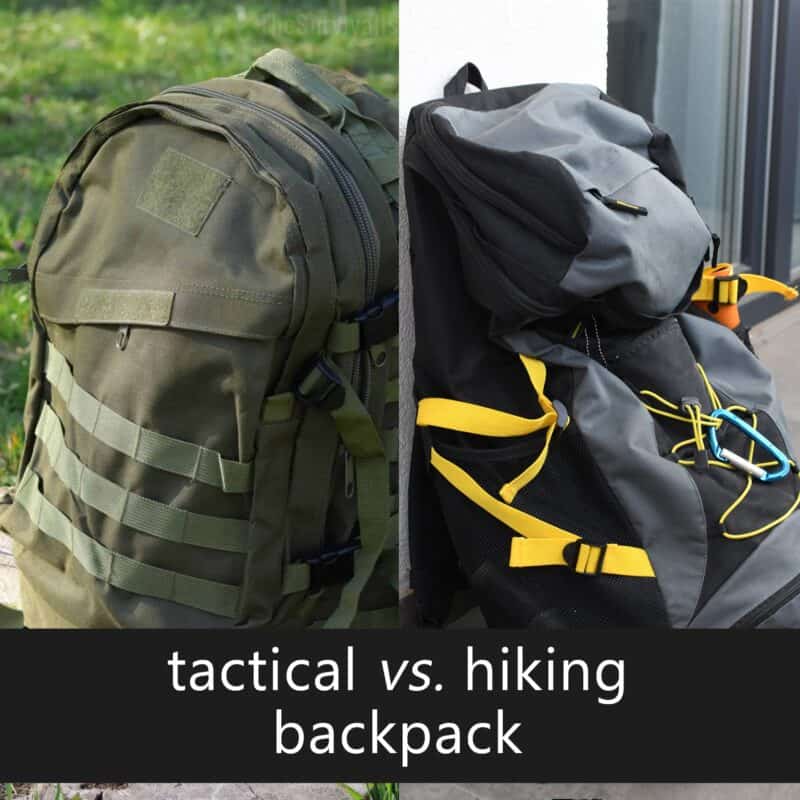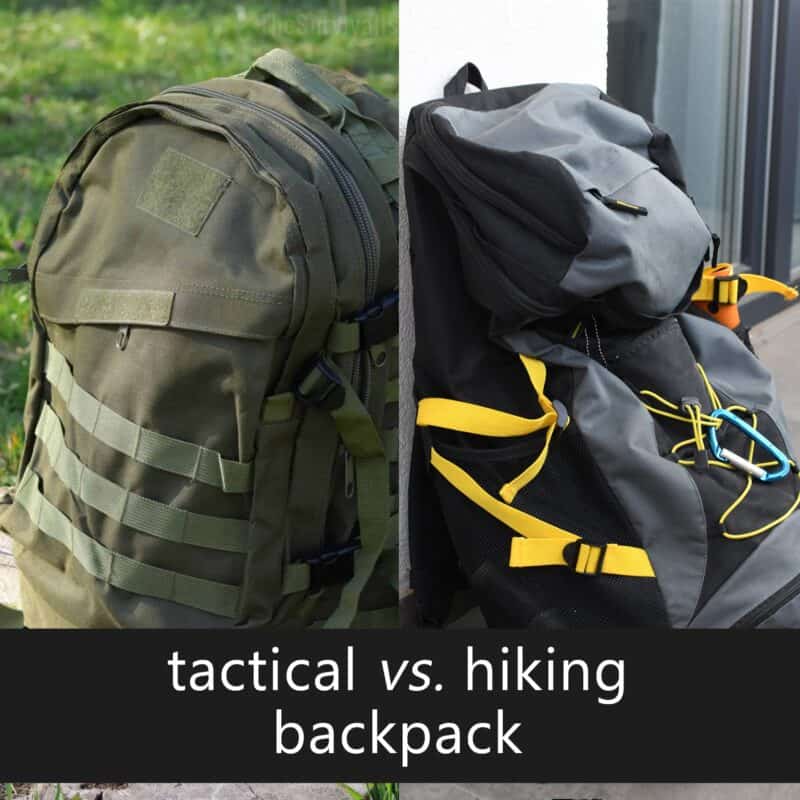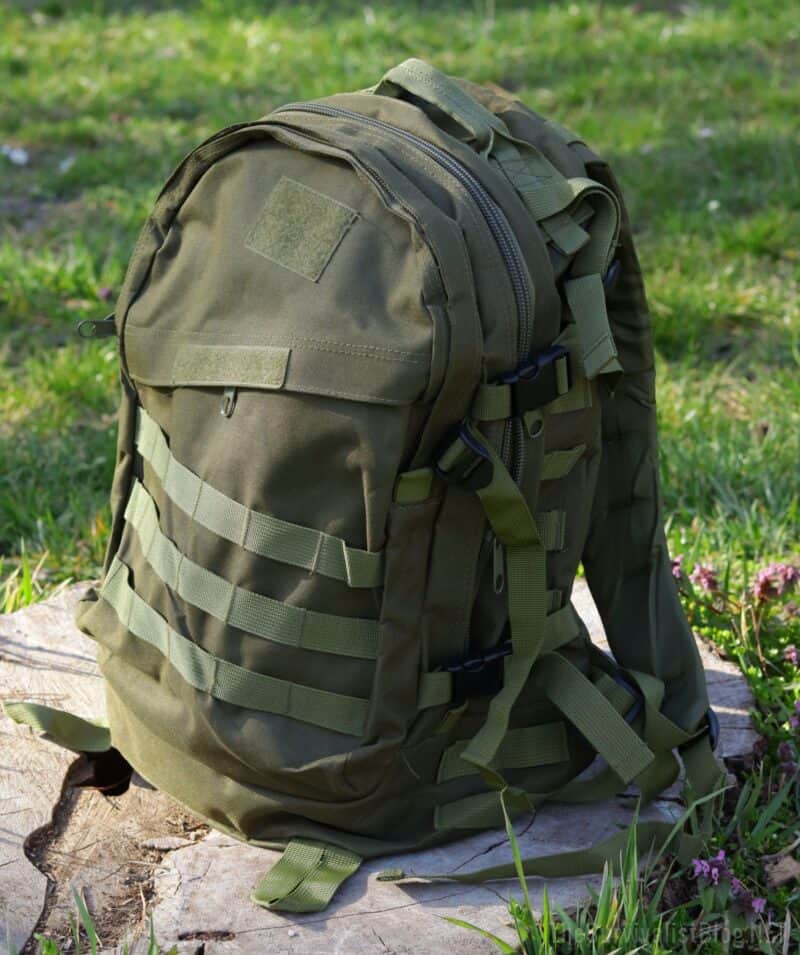What’s The Difference Between A Tactical And Hiking Backpack?

There
has
been
a
rising
interest
in
tactical
gear
and
military
surplus
among
civilians
who
are
interested
in
the
durability
and
functionality
it
has
to
offer.

vs.
hiking
backpacks
Within
the
camping
and
hiking
community
online
a
lot
of
experienced
enthusiasts
are
showcasing
how
tactical
backpacks
might
have
an
advantage
out
in
the
wilderness
as
opposed
to
traditional
hiking
backpacks.
The
differences
between
the
two
types
of
backpacks
are
distinct
enough
to
merit
separate
categories,
yet
you’d
be
surprised
at
the
lack
of
knowledge
regarding
what
those
differences
are.
Many
new
to
the
world
of
backpacking
probably
couldn’t
tell
you
which
is
which.
Tactical
backpacks
are
meant
to
be
used
to
survive
and
are
sturdier
and
more
functional.
Hiking
backpacks
are
designed
for
long-distance
travel
with
camping
gear
and
accessories,
and
have
the
wearers’
comfort
in
mind.
However,
saying
that
doesn’t
deny
the
benefits
that
the
average
hiker
would
have
using
a
tactical
backpack.
There
are
some
really
comfortable
and
functional
tactical
packs
on
the
market
that
would
work
just
fine
for
civilians.
Although,
the
mindset
you
have
to
go
in
with
is
what
would
you
value
more,
comfort
or
functionality?
|
Tactical Backpacks |
Hiking Backpacks |
|---|---|
|
Materials are more durable to withstand abuse while traveling. |
Build material is more geared towards waterproofing and being lightweight. |
|
International standard webbing on all tactical packs to add modular attachments for storage. |
Generally has loops for carabiners to hook items on the outside. Various straps allow for the attachment of gear underneath. |
|
Generally heavier for the military equipment used. Built in straps provide hip and shoulder support. |
Lightweight for the average hiker. May sometimes incorporate a frame for additional support. |
|
Organization is strongest with various pouches and zippered pockets. |
Generally a large rucksack style where you place organized items inside the main bag. |
Both
backpack
styles
have
multiple
variations
based
on
how
much
the
bag
can
hold,
materials
made,
and
final
construction.
While
these
concepts
can
intermingle
as
manufacturers
of
both
types
of
bags
take
from
the
designs
of
both
styles
and
implement
them
in
some
fashion.
Construction
Hiking
backpacks
are
made
for
the
trail
with
their
simple
layouts
and
light
materials.
You’ll
often
find
these
bags
can
fit
multiple
people
as
they
have
different
torso
lengths
and
adjustments
for
anything
else
you
would
possibly
need.
Tactical
packs
are
produced
to
cover
the
average
length
of
a
soldier,
and
don’t
have
all
the
adjustments
you’d
typically
see.
One
of
the
best
designs
for
a
tactical
bag
are
the
ones
with
a
zippered
cover
that
extends
down
to
open
the
bag
in
a
tri-zip
format.
These
allow
full
access
to
the
main
compartment
just
by
lying
the
bag
down,
much
like
a
camera
bag.
Most
hiking
bags
open
from
the
top
or
have
access
in
the
front.

green
tactical
backpack
with
Molle
webbing
Materials
In
more
recent
years
tactical
and
hiking
backpacks
have
been
sharing
materials
between
styles.
A
lot
of
manufacturers
are
turning
to
materials
such
as
Dyneema
or
X-PAC
which
are
lightweight
and
strong
fabrics
that
come
with
a
high
price
tag.
Hiking
backpacks
generally
use
a
form
of
nylon
called
ripstop
nylon
that
is
tear-resistant
and
waterproof.
These
types
of
backpacks
may
not
survive
a
tumble
down
the
side
of
a
cliff-like
their
tactical
counterparts.
Older-style
military
packs
were
made
of
heavy
canvas
materials
that
were
incredibly
durable.
This
added
some
weight
to
the
pack
but
provided
a
watertight
and
rugged
carrying
solution.
Additional
Storage
Tactical
backpacks
have
an
interesting
system
called
a
Modular
Lightweight
Load-Carrying
Equipment
(“MOLLE”)
which
is
a
series
of
webbing
loops
on
the
outside
of
the
backpack
that
is
designed
for
extra
pouches
and
bags
to
effectively
be
clipped
on
before
leaving.
The
MOLLE
system
is
universal
and
bag
manufacturers
around
the
world
use
it
which
makes
it
a
huge
advantage
over
hiking
packs
in
terms
of
modularity.
This
system
was
put
in
place
because
it
made
it
easier
to
pack
than
reorganize
the
inside
of
a
bag.
One
of
the
best
designs
for
a
tactical
bag
are
the
ones
with
a
zippered
cover
that
extends
down
to
open
the
bag
in
a
tri-zip
format
like
the
one
here.
These
allow
full
access
to
the
main
compartment
just
by
lying
the
bag
down,
much
like
a
camera
bag.
Most
hiking
bags
open
from
the
top
or
have
limited
access
in
the
front.
Since
tactical
backpacks
are
made
for
the
military,
manufacturers
want
to
make
everything
as
easily
accessible
as
possible,
which
is
why
they
are
so
popular
as
day
packs.

hiking
backpack
Comfort
A
lot
of
tactical
backpacks
are
made
of
some
form
of
canvas
as
it
is
both
durable
and
waterproof
but
it
does
add
quite
a
bit
of
weight.
Both
backpack
styles
have
padded
shoulders
and
hip
support,
although
hiking
pack
manufacturers
tend
to
focus
more
on
these
systems.
Capacity
A
lot
of
tactical
backpacks
are
in
smaller
capacities,
usually
between
15-20
liters,
as
that
is
what
people
generally
buy
as
day
packs.
There
are
larger
capacity
bags
but
those
can
be
expensive
due
to
the
increase
in
costs
as
you
add
pockets
and
add-ons.
Hiking
backpacks
you’ll
find
in
the
30
–
110
liter
range
which
are
more
suited
for
long-distance
hauling.
These
packs
are
often
supported
with
multiple
suspension
systems
and
adjustable
straps.
This
allows
the
packs
to
fit
on
a
variety
of
people
and
still
be
fitted
for
their
body
shape
and
strength.
Choose
The
Backpack
That
Fits
Your
Gear
With
the
lines
blurring
between
what
a
tactical
pack
is
versus
a
hiking
pack
there
are
still
some
distinct
differences
that
should
make
your
decision
a
little
easier.
If
you
are
going
on
a
multi-week
long
trip
with
lots
of
miles
being
covered
then
a
hiking
backpack
would
benefit
you
with
its
variety
of
support
systems
and
lightweight
material.
Needing
a
new
compact
day
pack
or
going
on
a
camping
trip
that
is
close
by?
Tactical
packs
provide
easy
access
and
the
modular
MOLLE
system
where
clipping
on
additional
pouches
and
packs
is
simple
to
swap
out
gear
depending
on
the
situation.

Perrin
is
a
nomad
surviving
and
thriving
in
in
the
Canadian
forests.
His
areas
of
expertise
include
wilderness
survival,
primitive
living,
tracking
wildlife,
and
teaching
others
about
this
way
of
life.
He
has
has
a
“first-responder”
certification
and
is
a
“leave
no
trace”
expert.
